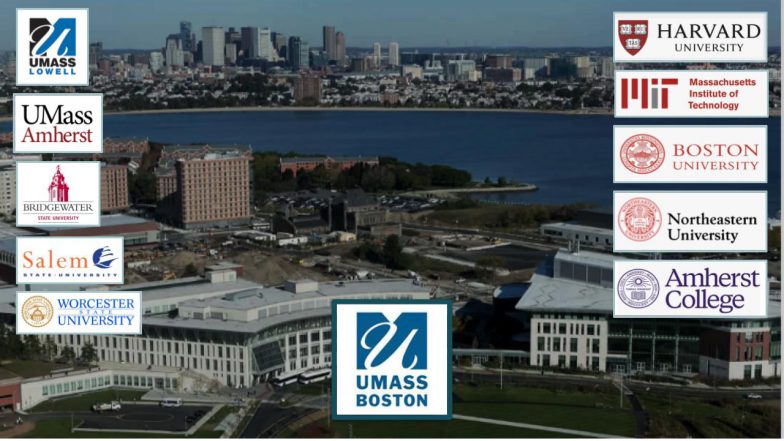Summary
The US onAir Network will be working with volunteers from Massachusetts universities, colleges, and nonprofit organizations to oversee the curation and moderation of posts, aircasts (online discussions), and in person events for the Massachusetts onAir Hub … related to federal, state, and local elections and government.
Our first outreach will be to University of Massachusetts Boston partly because of its proximity to the state capital. We have identified many of University of Massachusetts Boston’s civic engagement, academic, internship and research programs related to making democracy and civic responsibility a focus of higher learning on their campus … for students, faculty, staff, and local community. This post, over time, will have similar information on other collaborating organizations in the state.
Contact ben.murphy@onair.cc for more information on how to involve your organization.
University of Massachusetts – Boston
Source: The University
The University of Massachusetts Boston is nationally recognized as a model of excellence for urban public universities. The scenic waterfront campus, with easy access to downtown Boston, is located next to the John F. Kennedy Library and Presidential Museum, the Commonwealth Museum and Massachusetts State Archives, and the Edward M. Kennedy Institute for the United States Senate.
Part of the UMass system, UMass Boston combines a small-college experience with the vast resources of a major research university. With a 16:1 student-to-faculty ratio, students easily interact with professors because most teaching occurs in small class sizes. Ninety-three percent of full-time faculty hold the highest degree in their fields.
Civic Engagement Programs
Source: Office of Student Leadership and Community Engagement (OSLCE)
Leadership is an increasingly important skill needed to be successful in today’s global society. We offer several opportunities to develop and refine your leadership efficacy while making you a strong advocate for community and urban social issues. All of our programs promote and educate you on the importance of personal growth, community, and social justice. Ultimately, students learn how to create change that is responsive, reciprocal, respectful, and relevant to the needs of the urban areas of Boston and beyond.
Student Government
Source: Student Government
Governing bodies for students exist on the undergraduate and graduate level. Both groups represent their student constituents to the University community, and support programming and activity for their student populations.
The Undergraduate Student Government and the Graduate Student Assembly represent their student constituents to the University community and support programming and activities for their student populations, especially through undergraduate clubs and graduate professional organizations.
Undergraduate Student Government
The Student Senate: Comprised of representatives from the academic colleges, the Senate administers, through the Office of Student Activities and Leadership, the student activities fee that funds over 100 clubs and centers (CC-3-3003). www.umbgov.com
Graduate Student Assembly
The Graduate Student Assembly: Funds graduate professional organizations with several different types of grants to graduate students to assist their professional development and research. They have hosted a graduate research conference and plan social activities to bring graduate students from different programs together (CC-3-3404.01). www.gsa.umb.edu
Internships
Source: Academic Support Services and Undergraduate Studies
Internships:
- Are usually part-time with flexible hours.
- Can be paid or unpaid positions.
- Typically last for one semester.
- May sometimes take the place of coursework for that semester.
- May earn academic credit (the credits will appear on your transcript and will be added to your tuition and fee charges) Contact the related academic department to discuss.
- May or may not be directly related to your major or field of interest (but will probably need to be related if you’re seeking credit).
Co-ops (co-operative education assignments):
- Are full-time (30 hours/week or more) paid positions
- Directly relate to your field of study.
- Last for six months to a year.
- Offer substantive professional work experience.
- Typically (but don’t always) take the place of coursework for that semester.
Political Science Programs
Source: Department website
Undergraduate Programs
The Department of Political Science offers a variety of course options in the study of politics to prepare students for both professional success and informed, engaged citizenship in our increasingly globalized world. The department’s course offerings are organized into:
- Major in Political Science
- Minor in Political Science
- Major in International Relations
- Minor in International Relations
- Minor in Public Policy
The department has 13 core faculty members. Their research and teaching together span all four major subfields of political science:
- Political theory and philosophy
- American politics
- Comparative politics
- International relations
In the study of politics, our concern is both practical and evaluative:
- We endeavor to acquire reliable facts and sound analytic concepts so as to evaluate political phenomena confidently and carefully.
- We analyze local, national, and international issues and institutions.
- We draw on current data, historical studies, and theoretical approaches.
- We attempt to formulate standards for the appraisal of political life and the performance of institutions
- We strive to impress upon students that politics touches on virtually every aspect of a person’s existence
Thus, we are not merely concerned with understanding how societies are governed but also with the consequences for human welfare of various political structures, processes, and beliefs.
We hope thereby to assist in some way in the perennial quest of men and women for a just, compassionate, and responsible political order.
Research Initiatives
Source: Research
At UMass Boston, we are dedicated to rigorous, open critical inquiry, providing a gateway to intellectual discovery in all branches of knowledge, and a crucible for artistic expression.
Our faculty, research staff, and students foster imagination, creativity, and intellectual vitality. Responsive to the call of diverse disciplines, schools of thought, and public constituencies, we expect and welcome divergent views, thus honoring our shared commitment to expanding, creating, and disseminating knowledge.


